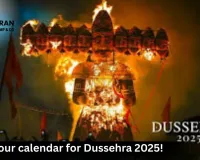Karwa Chauth 2025: A Celebration of Devotion, Love, and Tradition on October 10
Digital Desk
Karwa Chauth 2025, celebrated on October 10, is one of the most significant festivals for Hindu married women, especially across North and West India. The festival stands as a timeless symbol of marital devotion, love, and cultural identity, bringing families together in a vibrant display of tradition and faith.
Cultural and Religious Significance
Karwa Chauth is deeply embedded in Hindu custom, marking a day when married women undertake a rigorous fast from sunrise to moonrise for the longevity and prosperity of their husbands. The fast, known for its strictness, includes abstaining from both food and water throughout the day. The name 'Karwa Chauth' is derived from two words—'Karwa', meaning an earthen pot symbolizing prosperity, and 'Chauth', signifying the fourth day after the full moon in the Hindu month of Kartik.
This festival holds a dual meaning in modern times: while it remains rooted in the ancient traditions of prayer and sacrifice as described in Hindu scriptures and mythology, it also serves as a romantic festival akin to a cultural Valentine’s Day, signifying the emotional commitment between spouses. Over time, it has evolved to include expressions of equality, with many husbands now joining their wives in fasting, reflecting deeper companionship in marriage.
Rituals and Traditions
The celebration begins before dawn with the ritual of ‘Sargi’—a special meal prepared by the mother-in-law and consumed by the fasting woman. Throughout the day, women dress in vibrant attire, often red or brightly colored sarees, symbolizing marital bliss, and adorn themselves with jewelry and mehendi (henna designs). In the evening, women gather for community pujas (prayer gatherings), sharing folk tales and performing traditional aarti.
The fast is broken only after the rising moon is sighted. Women view the moon through a sieve or a dupatta and offer water (arghya) to it, praying for their husbands’ well-being. The husband then gives his wife her first sip of water and a morsel of food, marking the end of the fast—a poignant moment reflecting mutual care and affection.
Mythology and Legends
Karwa Chauth is steeped in legends, notably those of Savitri and Satyavan, demonstrating the power of a devoted wife’s prayers to bring her husband back from the brink of death[9][14]. Another tale is of Queen Veervati, whose steadfastness won divine favor and restored her husband’s life. These stories, passed down generations, reinforce the sacredness of the marital bond and the spiritual strength attributed to women’s devotion.
Modern Expressions and Social Impact
Today, Karwa Chauth is more than a ritual—it is a day of togetherness, family bonding, and celebration, with social media abuzz with festive photos, celebrity participation, and messages of love. Urban women see it as an opportunity to uphold their cultural identity, while also adapting traditions to contemporary lifestyles. The day is often marked by the exchange of gifts, and some couples even choose to fast together as a gesture of equality and partnership.
Karwa Chauth 2025 is not just a festival but a celebration of the evolving yet enduring spirit of Indian marriages. As women across the country come together in faith, love, and tradition, the festival’s rituals serve as a reminder of the power of devotion and the special role of women in sustaining the sanctity of the marital bond.

3.jpg)
1.jpg)
.jpg)







